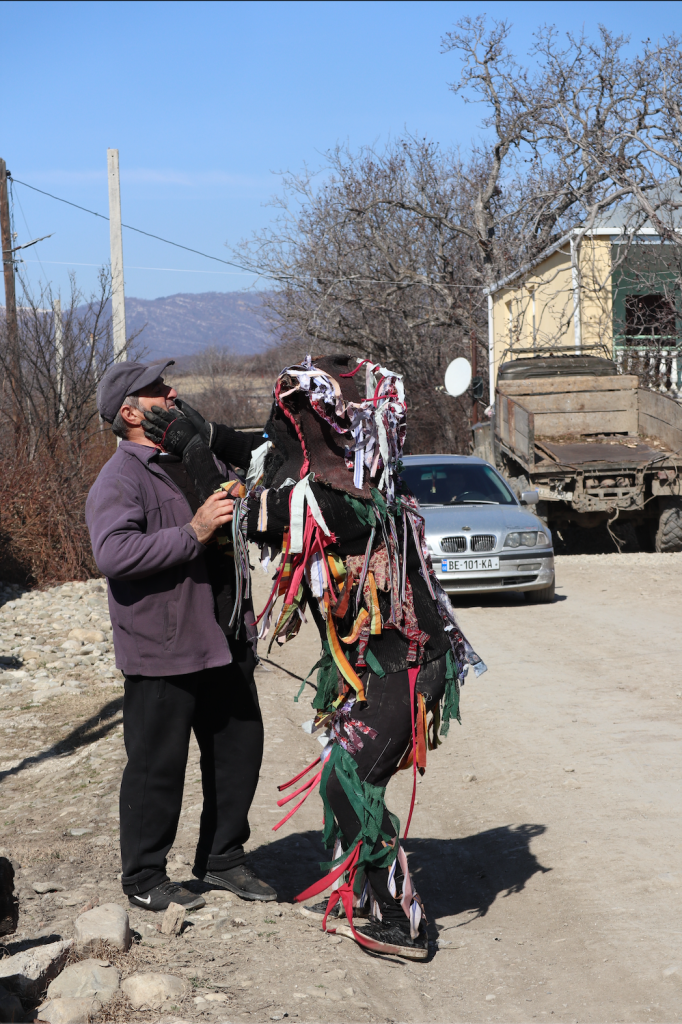Berikaoba: A centuries-old fertility festival in rural Georgia4 min read
On an unusually warm and sunny morning, a gang of colourful masked figures took over the quiet town of Didi Chailuri as part of a little-known Georgian tradition dating back centuries.
Each spring, Berikaoba (ბერიკაობა) is held to drive away winter and welcome in a fruitful new season. There is a heavy emphasis on fertility, both of crops as well as people. Didi Chailuri, featuring a population of less than 1,000, is now one of only three places in Georgia that celebrates Berikaoba. Influenced by the local history teacher Eka Veshapidze, the festival has grown in size in an effort to attract visitors and maintain the tradition. Today, the festival consists of a procession through town by the masked mummers, known as Berikas (ბერიკაობა), followed by a wrestling tournament accompanied by local food and wine.
Thousands of years ago, the festival likely started from a pagan temple. These days, the Berikas proceed by van — or in the case of the youngest Berika, by a quad bike — to the local church, where they remove their masks and light a candle before going out on foot to start the official procession through town.
As the Berikas dance down the main street, they go door-to-door expecting to be greeted with a donation. Entire families, from grandparents to grandchildren, wait outside with their gifts, excited for the arrival of the Berikas.
Though welcomed into most homes, the Berikas make a point to storm the yard, as if plundering the home. The most common offerings include puri (traditional Georgian bread), eggs, wine, and honey, though more extravagant contributions, such as an entire chicken, are also given. All of these donations are carried back to the van, where one young Berika sits, guarding the spoils.
Meant to represent the village’s ancestors, all of the Berikas cover their hands in mud, signifying their connection to the world of the dead. In return for the food and drink, the Berikas spread this mud on people’s hands, arms, or faces, blessing them. If you offend a Berika by not providing enough victuals, they will instead roll around on the ground, in effect cursing you and your family.
There is no special training to become a Berika — you just have to be local and to have grown up with these traditions. Strength is also an important factor. “It is a tiring job to be a Berika,” Giorgi, a former Berika who performed for close to a decade, says. “You have to be smart, fast, and flexible enough because people are constantly trying to take your mask off.”
Historically, the Berika masks and costumes were made using animal hides, adorned with ribbons, bells, feathers, and other natural elements. Today, the Berikas have started using more modern products in their costumes, from stuffed animals to balloons.
Theatre and pantomime is an important aspect of Berikaoba. The festival often includes a play staged by the Berikas, using historical references and political allegory, most often alluding to the numerous invasions of Georgia by its neighbours. For example, one of the most popular plays involves a foreign man — traditionally Arab or Tatar, but in more recent times, Russian — killing a Georgian groom at the altar and kidnapping the bride. The Berikas step in to revive the Georgian man, who is then able to retrieve his bride and restore fertility to the village.
This tradition had a huge influence on the work of Sandro Akhmeteli, regarded as one of Georgia’s premier theatre directors, and who significantly affected the development of Georgian theatre culture in the Soviet and post-Soviet eras. “Nothing can save us from degradation, except national art and also national theatre; we have our own theatre [Berikaoba] and I hope we will have it in future,” Akhmeteli said.
This year, no pantomime was planned, however, and the Berikas simply led the villagers to the main festival ground on the edge of town where food and wine was waiting.
After close to three hours of walking around the village, everyone was happy to enjoy some local delicacies. These newer additions have helped promote the event among both Georgians and foreign tourists alike. The highlight of the afternoon, however, is the wrestling tournament, in which boys of all ages participate in the hopes of winning a prize sheep.
Chidaoba (ჭიდაობა) is a traditional style of Georgian wrestling known for its chivalric code of conduct and use of the Georgian drum doli (დოლი) and other folk instruments as accompaniment. In 2018, it was inscribed in UNESCO’s Representative List of Intangible Cultural Heritage of Humanity.
By mid-afternoon, with the wrestling champion appointed and the food and wine consumed, the festival began to wind down. The locals dispersed back through the town and the masks were removed from the Berikas, signaling the end of this year’s festivities.
Though Berikaoba was inscribed on the Intangible Cultural Heritage of Georgia list in 2013, the tradition is generally unknown, even among Georgians themselves. Those in Didi Chailuri hope to change this, and by all counts, it seems they are on the path to succeed.





















